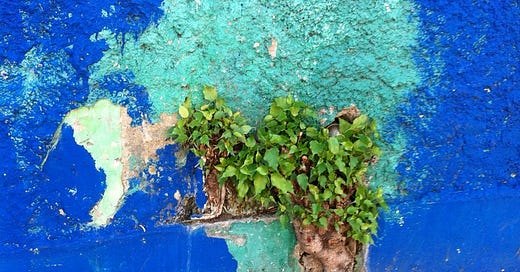Of all the challenges that writing throws up, and it throws up plenty, the solitude that writing demands has always been, for me, among the most difficult. A difficulty linked partially to my upbringing: I was born and raised in the hyper-gregarious core of Santo Domingo, in Villa Juana, which in the 70s was one of the most densely populated of the barrio populares. We were not just surrounded by neighbors; we were literally inundated by them. The walls of our slapdash house were not sealed, not from the elements that threaded down on us through the zinc roof or roared in through the wooden slats; not from the scent-siren of ripening mangos or the coffee brewing in the callejón; not from the mosquitos or the lizards or the flies; not from the neighborly chatter or the endless cacophony of the thirdworld city. In my first home everything was porous, everything immiscible, everything flowed.
Growing up in a large extended family--my mother, her two sisters, their spouses and children, our grandparents, my five siblings, the neighbors who were often over, on a street that teemed with children, maniples of children -- my brushes with solitude were brief. I didn’t even have my own bed and there were times I wondered if my dreams were my own, how often they were overrun with the people around me.
Such was my baseline.
Imagine the shock then when we dropped into that Silence that was America. Into the sealed bathyspheric seclusion of our new apartment. Into the Loneliness of our new gringo lives.
In the novel, The Golden Compass, every human has an externalized soul, an animal-shaped daemon, and the novel’s churchy antagonists invent a catastrophic procedure called intercision that severs children from their daemons, rendering them half-catatonic. When I first read about intercision I immediately thought about my first years in America. Immigration felt like an intercision. No sooner had I arrived in NJ that something vital was in me was severed and never ever regrew.
Immigrant life being what it is, one must figure out ways to avenge oneself. My mother avenged herself through work and through a devotion to God. In my first years I avenged myself through reading; later through writing.
Seems contradictory. Reading, after all, is a fundamentally solitaire practice. My response to American isolation, American loneliness, was more isolation and loneliness?
On the surface a contradiction, but not really at a deeper level. Reading was a lesser loneliness that assuaged a greater one. I might have read alone but in the chorus of characters and voices that I encountered in books, I regained something of the community that I lost when I immigrated. In reading, I recalled something of my older self; reading gave me back what the intercision had taken.
With writing, even more. When I write, there often comes a moment when all the pieces of me, even those that I thought lost forever, reassemble themselves, and the me that was and that me that is inhabit one another, radiantly.
And yet…
And yet for all that writing and reading give me, I still struggle with it solitudes. Too many unhappy associations. Too much unmetabolized hurt.
The old scars never healed, I guess.
I’ve been at this game long enough that I’ve evolved strategies. I started writing in the early morning when my heart seems to tolerate the seclusion better. I keep the page-sessions short. I make sure to hang with friends as often as possible. I do plenty of therapy and that helps me mourn the childhood world I lost, the agonies of the Silent Years.
I have written books, won awards, made a name for myself as a writer and yet I rarely feel like I was made for writing, like I’m a natural. (And I have years upon years of non-writing to back that feeling up). Used to bother me something fearsome, how much I struggled, and in my upset I made the process even more struggle-ly than it needed to be.
I now understand that sometimes we have talents in precisely the areas that are most challenging to us. Strikes me that this is far more normal than being a total natural or a supernatural savant.
If you feel like you do your art in spite of yourself, you ain’t alone, welcome to the club.
Don’t be discouraged.
Remember always: a book or a story or a poem performs its magic – can change a life – whether it was written by someone who struggled or by someone who didn’t.
And that simple truth, more than almost anything else, is often what brings me back to the page in spite of all the failures, all the disappointments, in spite of myself.






Thank you - so beautiful. I struggle everyday with writing - when I write and mostly when I don't. It has never been easy. But I long for it - like an old lover that suddenly leaves you without warning. I am sad when I don't write, but sometimes sad when I do. It is never enough. I am not a natural; I am a foreigner to writing. Everyday I try to find my way, navigating unknow terrains - tripping and falling. Occasionally I walk and sometimes even skip, forgetting where I am.
This line really hit me: “I now understand that sometimes we have talents in precisely the areas that are most challenging to us.” I really believe that to be true. Junot, do you think your writing is is better because you struggle with the solitude? Does that angst ever inform a character, for instance?